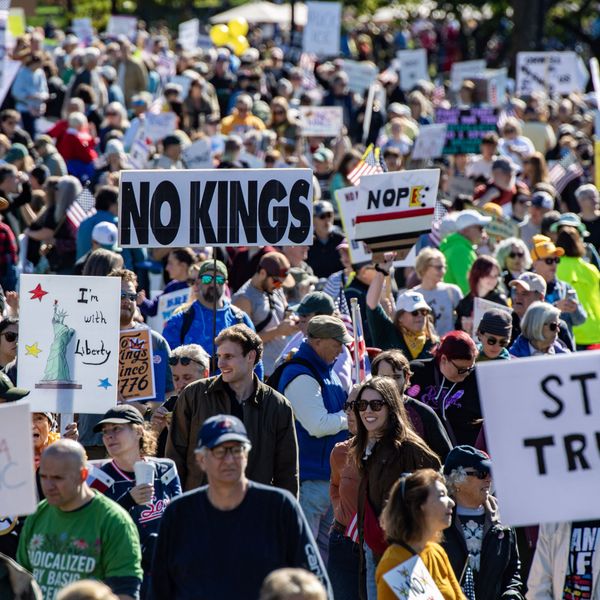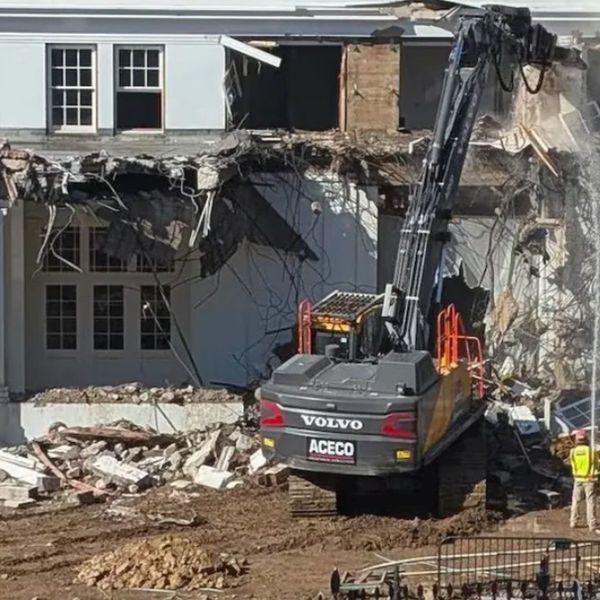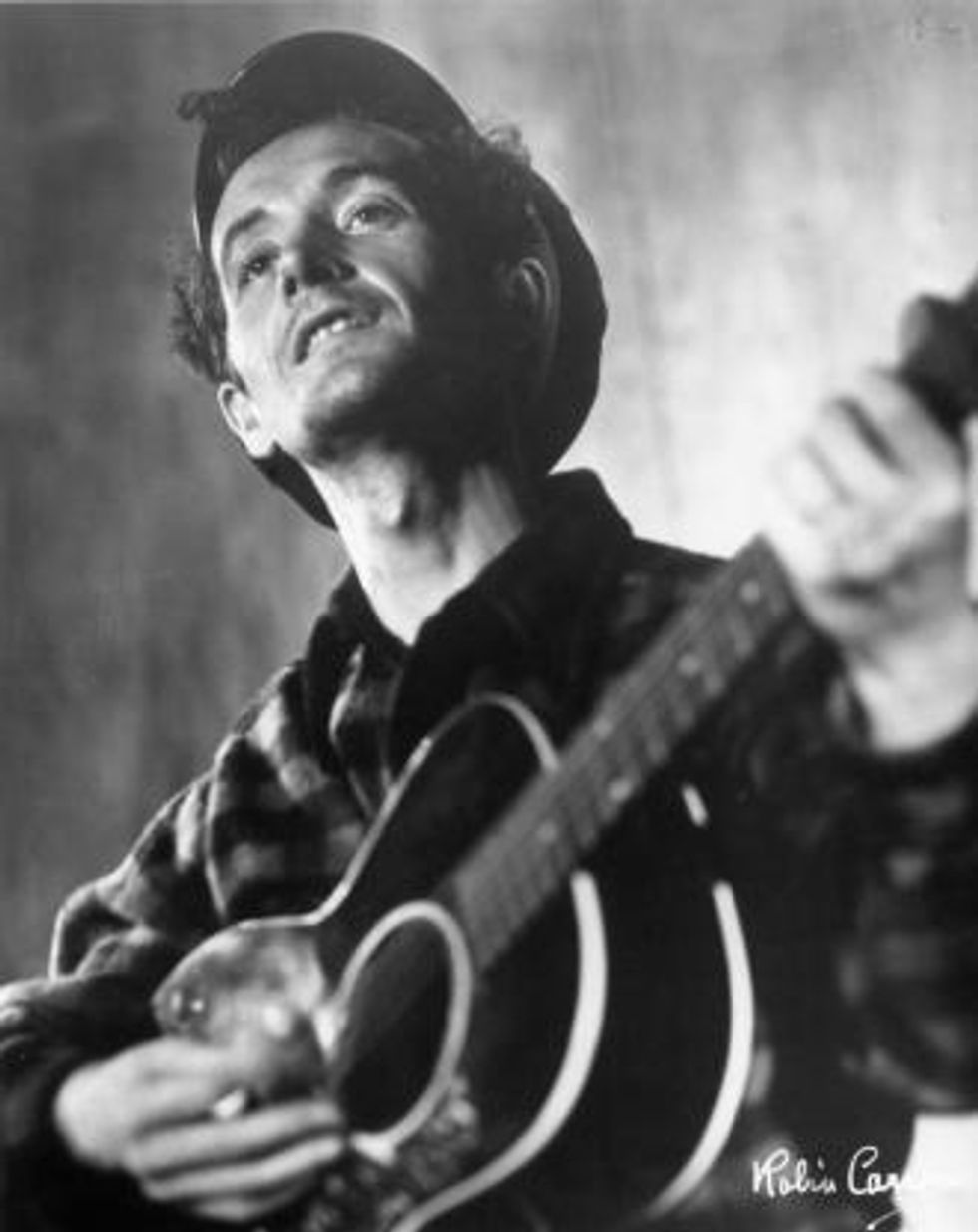While all eyes and ears are trained on the elections, Woody Guthrie, whose 100th birthday we celebrate this year, offers up another perspective on politics. In his poem "This Is Our Country," he wrote, "I seen the pretty and I seen the ugly and it was because I knew the pretty part that I wanted to change the ugly part. Because I hated the dirty part that I knew how to feel the love for the cleaner part."
Before getting to the pretty and the clean: The ugly and dirty in government policies and laws are on stark display right now. Those along Hurricane Sandy's route are reeling in the climate-change backlash of government negligence on the environment. Corporations, which are defined as persons in the Constitution, have been given carte blanche to run roughshod over the economy, elections, many politicians, and national food and agriculture systems. Collective bargaining and labor organizing rights have been all but destroyed. Vital social services for those without safety nets have shrunk. Foreign-born people are increasingly criminalized, and Muslims are persecuted with endlessly evolving creativity. (Just this Monday, the U.S. Supreme Court denied an appeal of the Holy Land Five, meaning that five men will spend from 15 to 65 years in prison for making contributions to Palestinian groups.) The ugliness is exhibited in the assassination by drone of those on Obama's "kill list," and a lot of others who just happen to be nearby. We see it in trade policies that allow the plundering of indigenous territories throughout Latin America. The litany of wrongs fills libraries.
Of course the Democrats and the Republicans are distinct. Yet we should be honest and admit that these and many other ills have been created and perpetuated by administrations and congresses of both parties.
As for that pretty and clean, we're awash in it, too. The engagement of citizens (no matter from which country) over time, notably organized in progressive people's movements and grassroots defenders, have helped make and keep it so. We can thank the slavery abolition and women's suffrage movements, and the populist, anarchist, socialist, and labor union movements. For some of the best of what our society offers today, we can tip our hats to the movements for civil rights and Black power, Native American sovereignty and Chicano power, feminism and womanism, rights for LGBTQ and people with disabilities, ecology and environmental justice, and so many others.
"When November 7 rolls around, I'll recall - and I hope you will, too - that democracy is partially safeguarded (or not) by what we do in those little voting booths, but even more so what we do the other 364 days of the year."
Right now we have activists and the NGO swarm (as a Rand Corporation study famously called non-profits as they go after a political target) focused on climate change. They're deployed through the Tar Sands Blockade in Texas, where protesters have been in trees for more than a month to block pipeline construction (the most recent in more than a year of nation-wide protests), plus the actions of 350.org and many others.
The past year has seen the rise of the Occupy and the 99% movements, which have brought to the center of attention the urgency of reigning in corporate capitalism and redistributing wealth. We have groups seeking to wrest political power from the corporations and put it into the hands of the people, led by Public Citizen, Public Campaign, Move to Amend, and friends. We have a powerful farmworker movement in the form of the Coalition of Immokalee Workers, which just won a campaign to get Chipotle Mexican Grill to sign onto the Fair Food Program. This is the Coalition's eleventh victory among large retailers, moving us closer to a national supply of fruits and vegetables that are harvested with dignity, rights, and fair wages.
The U.S. is full of those trying to claim economic justice for low-income and working people and people of color, spearheaded through such groups as the Poor People's Economic Human Rights Campaign (whose national coordinator, Cheri Honkala, is running for vice-president on the Green Party slate), Jobs with Justice, Justice for Janitors, Right to the City Alliance, and Women's Economic Agenda Project - to name a few. Young people have put their education and livelihoods on the line and risked deportation to campaign for the DREAM Act, which would offer a pathway to citizenship for undocumented youth.
We have networks defending Native peoples' lands and resources, along with the rights of Mother Earth, propelled by the Indigenous Environment Network, White Earth Land Recovery Project, and a host of others. We are home to a movement to stop the U.S. wars, led by groups like Courage to Resist, Iraq Veterans Against the War, Veterans for Peace, Code Pink, and Friends Committee on National Legislation. (You can read about many more committed and effective movements and organizations at www.otherworldsarepossible.org.)
So along comes the first Tuesday in November. For more months than I care to remember, obsession with the elections has eclipsed the threats to life and rights, and the viable solutions to them. I will vote, since I am not a member of the expanding social sectors whose votes are being suppressed. (And if you want to stand up for the full enfranchisement for which the Voting Rights Act was enacted in 1965, look to the NAACP for guidance). And I will hope it gets counted fairly, since I don't live in Florida or Ohio.
And then we'll face the morning after. As I make my political action to-do list for that day and those that succeed it, I'll remember my friend Francisco of the Landless Workers Movement in Brazil, whose millions of members work mighty hard to build direct democracy in their communities and their nation. I once spent several weeks in the cooperatively owned and self-governed land reform settlement where Francisco lives. His family and about 100 others won the vast tract after a fierce political and legal battle and a two-year occupation, during which they lived in plastic tents and faced repeated violence. At the end of my stay, as Francisco waited with me for a bus that would take me back to Sao Paulo, he said, "You know a lot by now about how democracy works in our country. How does it work in yours?" I replied, "You might not believe this, but the main political preoccupation of most people in the U.S. is whether a Republican or Democrat occupies the White House." He looked at me hard, I think judging if I were serious. Then he said, "That's barbaric."
When Clinton and Obama were elected, a lot of liberals and progressives sat back and said, "Whew! Okay, we can take a break now." We saw the same when integrity-filled presidents came to power on the heels of tyranny in the Philippines (1986), Haiti (1990), and South Africa (1994). As we saw demonstrated in the let-downs (for very different reasons) of those five administrations and a lot more since, we cannot take a break. We cannot leave it to a head of state - any head of state, ever - to guard democracy and public well-being.
When November 7 rolls around, I'll recall - and I hope you will, too - that democracy is partially safeguarded (or not) by what we do in those little voting booths, but even more so what we do the other 364 days of the year. We'll have to get cracking, because we have a big job ahead of us. Cleaning up the dirtiest parts of this country will take a lot of elbow grease and moxie, and we can't trust the job to the president. We can get involved in fights for justice and equity, and be government watchdogs, on any issues we feel passionate about. We can join up with the groups above, or start one in our own community. Some organizations put out regular action alerts to make our work easier, like Color of Change, Avaaz, and Amnesty International. But clicking a button to sign a petition should be our starting point, not our ending point.
Another thing I'll do on November 7, no matter who wins: put Guthrie's "This Land Is Your Land" on the jukebox and dance my heart out. I hope you'll be on the dance floor, too, so that together we can stomp and clap and make enough noise so the new president will have to pay attention. And I, for one, will sing along especially loudly to the three verses that are almost always excised:
As I went walking I saw a sign there
And on the sign it said "private property."
But on the other side it didn't say nothing,
That side was made for you and me.
In the squares of the city, in the shadow of a steeple,
By the relief office, I've seen my people.
As they stood there hungry, I stood there asking,
Is this land made for you and me?
Nobody living can ever stop me,
As I go walking that freedom highway;
Nobody living can ever make me turn back
This land was made for you and me.
And from then on, we - which I hope will include you, too - will be listening and asking hard questions. We will refuse to consent, comply, or capitulate to what is foul in our political and economic systems. We will continue defending the best of what we have and mobilizing to do away with the worst, through building our activist networks and communities and unions, educating, protesting, taking legal action, and changing laws. We will endeavor to reclaim democracy and set the government on the path toward a land that is truly for you and me, for all of us.


